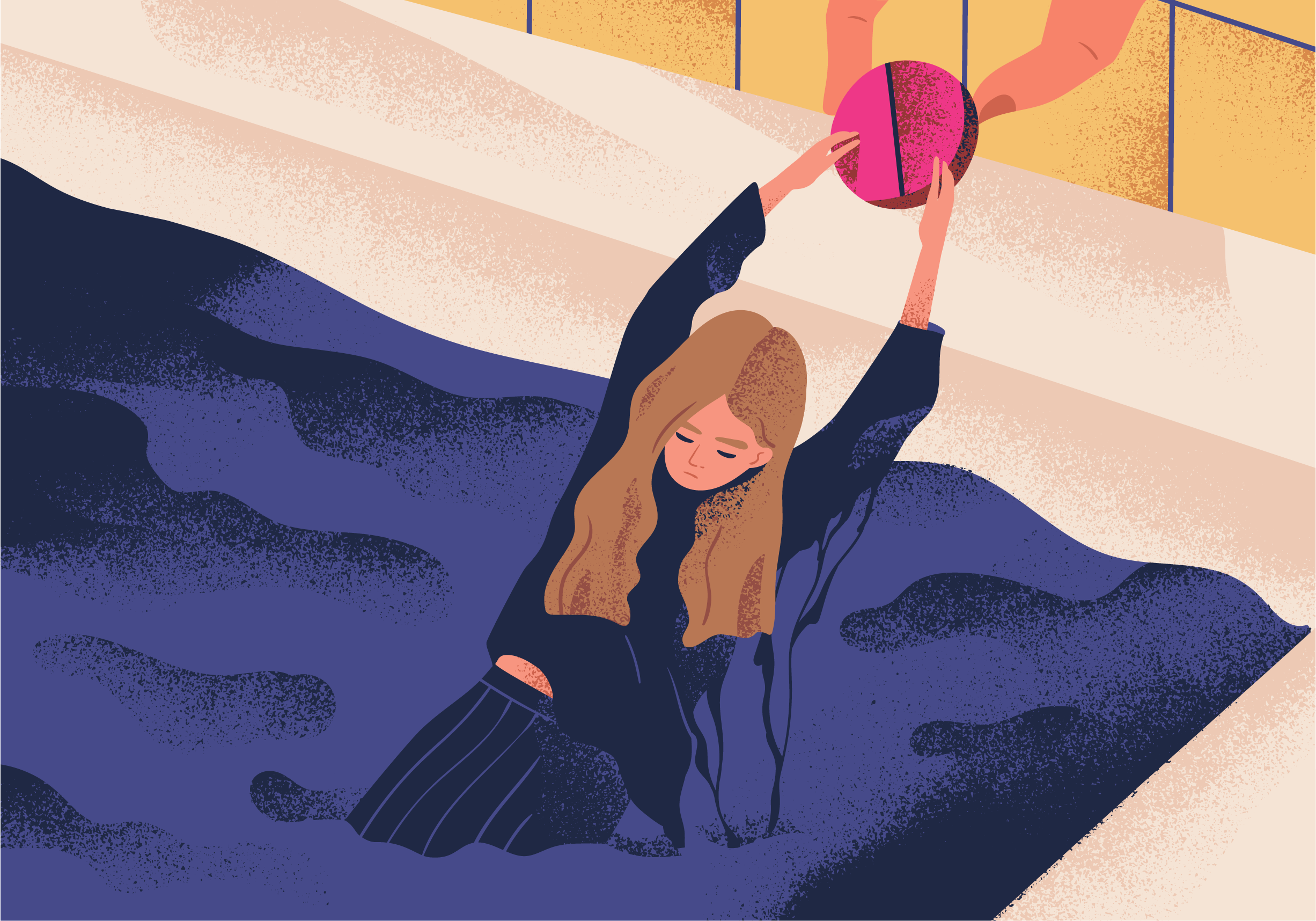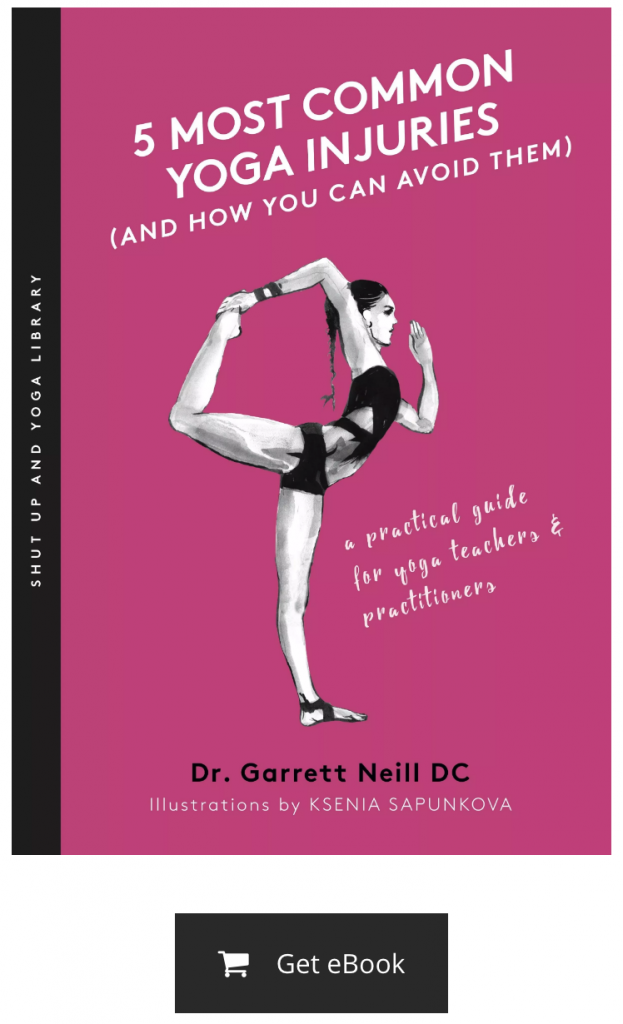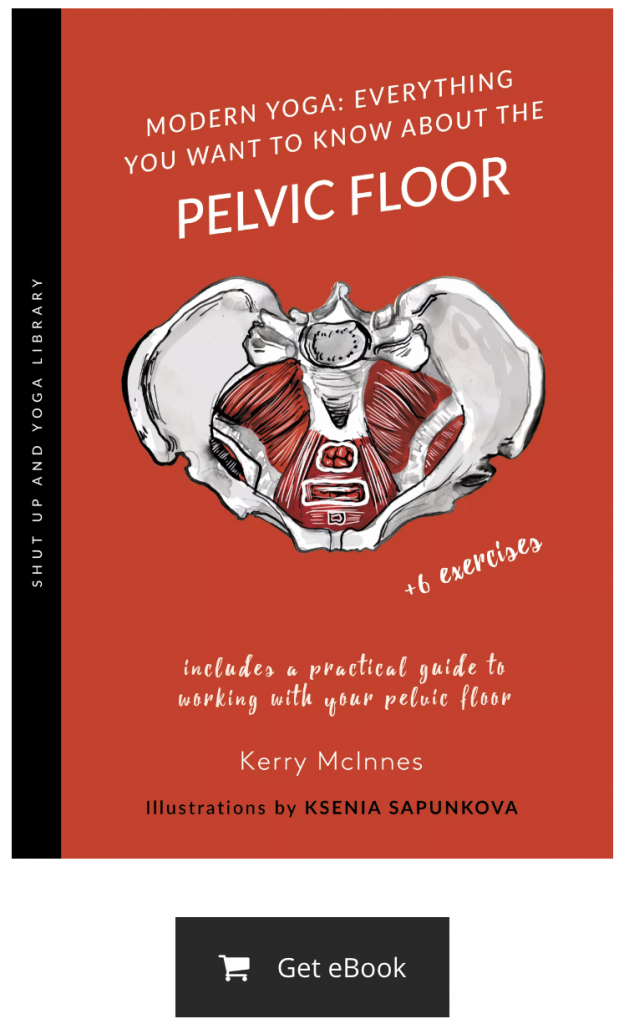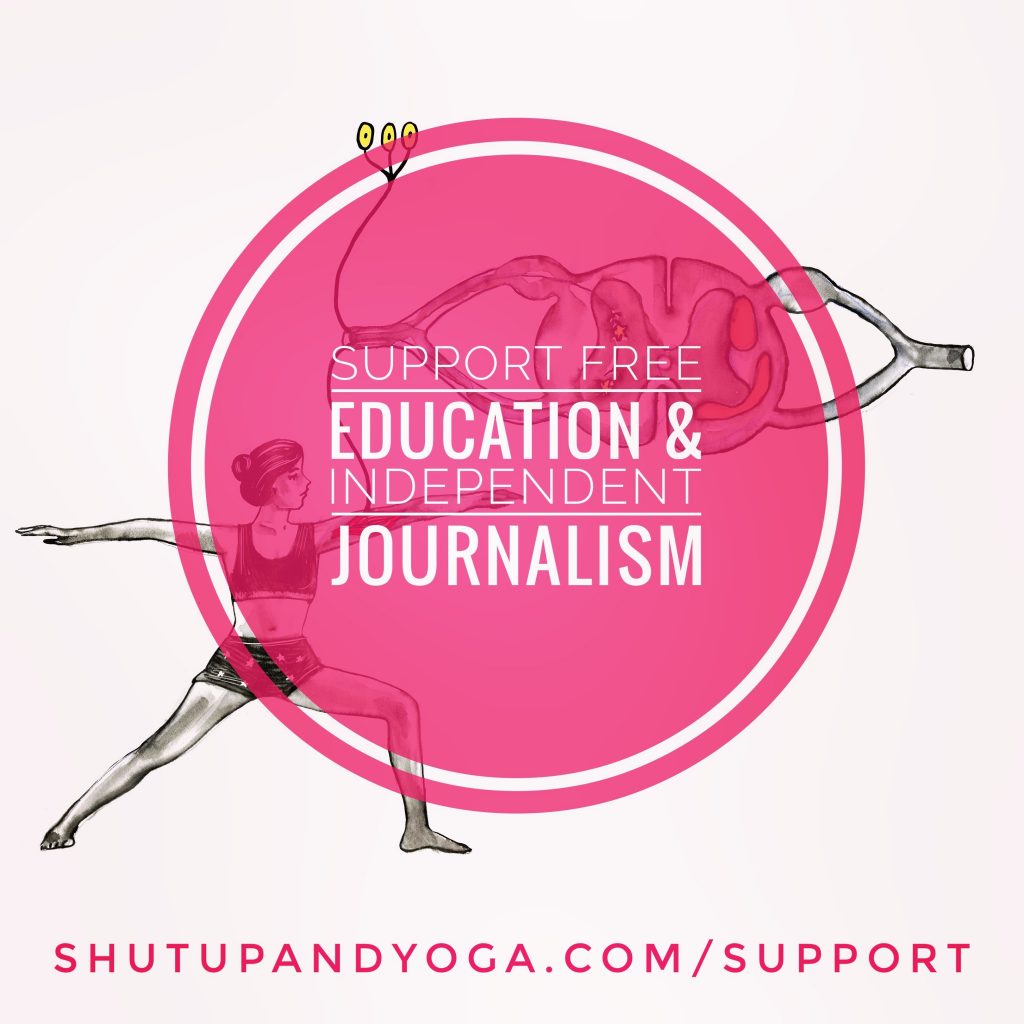TW: Sensitive Content. This article contains content about mental illness and antidepressant medication that may be sensitive to some people. Please use your discretion when deciding whether to read it.
A few months ago, a reader in the yoga teaching community commented under a post in the Shut Up & Yoga Forum Facebook group: “Lately I have been approached at my studio by apprentice teachers who are struggling with mental health problems but are afraid to go on medications. I’d say more than five, less than ten. They are afraid it will make them not a yogi and they are asking me how I do what I do and still practice. I think it’s crazy that this is an expectation, and I’d love you guys to cover this.”
When I saw this request for more exploration of such an important topic, I knew I wanted to throw my hat into the ring. This is an issue we are almost entirely silent on in our yoga community and its bedfellows. And yet this individual’s experience is far from rare.
I regularly hear from my friends, students, and clients that they have been given unsolicited advice from their yoga teacher, meditation instructor, or life coach, urging them to use “natural methods only” to address their mental illness. Myths, misunderstandings, stigma, and stereotypes surround mental illness. They increase the isolation, shame, and helplessness often felt by sufferers, and a significant proportion of these will go to yoga to find support and understanding.
The expectation that you are somehow “not a yogi” if you are taking medication for your illness needs to be challenged. To those getting help from their treatment as well as those considering it, it is at the very least also patronising, offensive, and shaming, and at worst could be highly dangerous. The question is, why are so many people hearing this advice? What are the motives of people offering it? And is it the place of a yoga teacher and the like to offer such advice at all?
This article seeks to offer some insight into the experience of mental illness and explore the stigma around medication. It takes a good look at the role of the yoga teacher when it comes to supporting their students and suggests approaches and resources for both teachers and students, in the interest of supporting our collective relationships and wellbeing.
An Important Conversation
To get some on-the-ground insight into these questions, I spoke to Alison Sykes of Clear Skies Yoga, a respected yoga teacher and business owner in Brisbane, Australia. She has 13 years of experience running general classes as well as having a therapeutic practice for people dealing with injury, illness, and chronic pain. Alison is devoted to a “no-bullshit” approach to yoga, and to helping individuals harness the yoga they need in that moment —physically, emotionally, and spiritually.
She says: “This is a hugely important conversation. How revolting is it that we live in a world where people will judge somebody for taking antidepressants just because that person is a yoga teacher? This idea that taking antidepressants proves yoga doesn’t work is just so shallow and narrow-minded. Yoga does not fix everything.”
Alison took antidepressants for a short time, and while she doesn’t believe they brought her as much benefit as yoga and psychology did, she is glad she tried them. Had they worked, she would absolutely have continued to do so.
“Antidepressants have been a part of my experience as have depression and the work of Cognitive Behaviour Therapy,” she says. “I am also a yoga teacher and a very good one. I am not ashamed of anything I have experienced or done, and if anyone is bothered by that, then I don’t want them to come to my classes. They are going to put me on a pedestal that could be potentially harmful to them. It astounds me that we would be so blatantly dangerous in our community as to shame someone for the use of medication or indeed any other type of health care.”

I share Alison’s concerns about the risk of shaming our students by showing disdain for a certain course of action they have taken. As an experienced teacher and mentor in the wellbeing space, I feel strongly that it is not my role to tell people what they need or don’t need. It is my role to hold an honest and authentic space of non-judgement so that they are able to make an enquiry into their own personal needs and desires with regard to healing and thriving. I don’t see myself as above or beneath my students and clients, but as a fellow human who can be an ally, perhaps, for a little while.
The fact that I have never taken disease-modifying medication for the Multiple Sclerosis with which I have lived all my adult life, but that I have in the past chosen to take antidepressants, does not make me an advocate of taking or not taking medication either way. It does, however, make me an advocate of personal sovereignty and personal choice, and this is what we invalidate in our students and teachers when we shame their decisions as “non-yogic.”
I have personal reasons for taking a strong position on this issue. Antidepressant medication saved my life.
An Integral Approach
Without it, twenty years from the day that first tablet passed my lips, there is no doubt in my mind that I would not be here, perched at my desk on a Thursday morning in 2020, writing this piece. I was in so much suffering; I was struggling to see how I would manage the next few minutes of my life, let alone the next decades.
Was I practicing yoga and meditation? Yes. Was I taking vitamins and minerals and getting fresh air and daylight and exercise and avoiding stimulants and drinking litres of water? Yes, I was. Was I journaling? Well, d’ oh. Did I have people to talk to? Yes, I did. Was I loved and cherished? Without a doubt. Were all these things reaching the parts of my mind-body that were so seriously sick and injured? Tragically, they were not.
I wish they had been enough. Everyone who cared about me wanted them to be enough. I worked hard; I did all the things, I opened myself to the possibility of healing in everything that I could. It’s not nice to be young, with seemingly everything you could want in life and quite possibly more good things ahead of you, and to live in such inner torment that sometimes you wished you hadn’t woken up in the morning. It’s mystifying and frustrating, and you would do anything to turn it around.
What I was dealing with needed another intervention.
And yet, for a full year, I walked around with a prescription for antidepressants in my pocket that went unfilled for the very reason that I believed it would be an act of weakness to commit any part of my healing to medication. Even as I write these words, a desire to run back and grab that young woman stirs in me so strongly. I want to tell her: “You have a beautiful life ahead of you, and you don’t deserve this suffering. You don’t have to struggle. Take the lifeline. I promise you that you will forever bless the day you did.”

Severe depression and acute anxiety are illnesses. They are not lifestyle choices or bad karma, a mark of weak character or a failure to get it together. We do not earn mental illness any more than we earn cancer or multiple sclerosis.
One of the key indicators of whether depression will worsen is how quickly an intervention is made. The longer we leave depression brewing inside us, the more tenaciously it sets in and takes us down with it.
I was so ashamed of the idea of taking medication that I unwittingly allowed myself to become acutely ill and to the point where I could barely function. At that stage, my self-esteem was so low that it didn’t really matter to me anymore if I surrendered to shame. I went back to my doctor and told her that I needed medication, and I needed a good therapist —not the kind that makes you dwell in your illness and talk-talk-talk while they nod-nod-nod without offering you a tool to your name. This was my rock bottom. But it was also Day One of my recovery, a recovery that I now know could not have happened any other way.
It took me a full year to take that step and prior to that, a full year of experiencing increasing mental distress before even seeing a doctor. That is two years of unnecessary suffering and struggle.
Do I feel shame now? Not a jot. Healing internal shame was a big part of the inner work I was called to do, as it turned out. For me, medication allowed me to sleep peacefully, to eat properly and to see a perspective where once the horizon had been obscured by dense clouds. It created vital space for my inner work to proceed.
I want to open a conversation about this. I want to begin to unpack the reasons some people are compelled to want to —and think they have a right to— inhibit others from taking medication. And I want to address the internal shame and fear experienced by sufferers of mental distress, which are not their fault or their identity, and yet can sometimes feel like they are. This is the kind of shame and fear that allows people to resist healing inadvertently. This is the kind of shame and fear that can be instilled even more deeply by a well-meaning “let’s just stay all-natural” yoga teacher. This is the kind of shame and fear that is taking the lives of our brothers and sisters in the world.
In doing so, I recognise that this is a complex area that deals with stigma and assumptions, boundary-overstepping, the teacher/student power dynamic, interpretations of spiritual frameworks and ideologies. There is no “universal fix” for all.
Illuminating Research
My wonderful and wise therapist, now passed on, taught me many valuable life-and-soul lessons during our work together, but two seem particularly pertinent for this piece. I remember him speaking about the statistics around the success of therapy, based on some very robust and replicated research. It took three sections of people undergoing treatment for mental illness as a broad category: those taking only medication, those only receiving therapy, and those both receiving therapy and taking medication. The third group showed significant success in either recovering completely and never needing treatment again, or in making a good recovery and being able to swiftly repair from a future relapse. Speaking from personal experience, he said that he found once his patients were taking medication, they were more present, more motivated, had more energy and a sense of hope. They were more able, therefore, to approach the learning and commit to the practices within the therapy. This was exactly my experience.
The second insight came from his re-telling of what some of my fellow yogis will recognise as the Indian fable Kupamanduka – The Frog In the Well. He was from Malaysia and of Indian origin, and had been told the story growing up. In his version, the frog was under a clamshell, instead of a well. The story explains how the frog has lived his whole life under that clamshell – it is the only life he has ever known. He believes the dimensions of the shell are the dimensions of the world –the width and breadth of his life experience is contained there, and he does not believe in anything outside of that. One day, a frog who lives on the lake arrives and persuades the frog under the clamshell that there is more to life than he is seeing. The frog is disbelieving and refuses, at first, to leave his clamshell. Eventually, however, curiosity gets the better of him, and he finds himself led by the other frog to the vast, wide-open lake –a whole world away from what he knows or ever thought possible, but a world that exists nonetheless.

“Where you are now,” said my therapist, “is under a clamshell. You have been ill for a while and you have got used to certain experiences always going the same way. It is hard for you to believe in a life beyond that shell –but it is there.”
I think this fable so aptly speaks both to the self-styled authority on a yoga-health-protocol and to the person suffering the persistent hold of hopelessness that comes with mental injury. Be careful on what grounds you write something off. It just may be that you are stuck in a certain position. It is important to find a way to shake off that clamshell –shake off all you thought you knew– and be open to another possibility.
Tackling The Myths and The Misconceptions
Here are some of the most-frequently-cited arguments put forward by those offering advice against taking medication for mental or emotional health challenges, whether solicited or not.
- “It’s a Quick Fix, An Easy Way Out”
Medication is by no means a quick fix, but for many, it is a way of releasing one’s body from the total paralysis of illness. It can enable one to start placing one foot in front of another on the path to healing and home.
Assuming people have not tried other interventions is both presumptive and offensive. I have often sensed an insidious “people are lazy and need to take more responsibility for their lives” trope in the field of personal growth, and this idea that a pill is a quick fix to happiness feeds into that. The “get a grip,” “take some responsibility,” “do the work,” narrative places shame and blame on people who are already beating themselves up on the inside. It is similar to the “suck it up” and “there are people going through worse things, what have you got to be unhappy about” ideology. They are part of the reason people suffering feel unable to reach out for help, sometimes with catastrophic results.
- “They Are Just Happy Pills”
Wouldn’t it have been lovely, says my twenty-something-year-old self, if there actually were pills that could take you out of despair and into peace and happiness. Think of all the things I could have done, having had all those years of my life back. Fancy, if we didn’t have time to motivate ourselves to exercise and go to yoga and meditate and make friends and find a mate and plant a garden and attend to deep self-care… We could just take a pill that produced the same results, sit back, and smell the roses we didn’t need to plant ourselves.
Only people who have not taken this medication refer to it as “happy pills.”
“I have heard people say yogis should not use substances that alter their consciousness,” says Alison Sykes. “But when your brain chemistry is altering your consciousness, is it wrong to seek an intervention proven to bring it back into balance?”

The function of antidepressant medicine, when it is properly used, is not to provide a “buzz” or a “hit” or make the world psychedelic –but to intervene with certain chemical processes in the brain that are causing dysregulation. If and when other interventions to regulate our nervous systems aren’t providing results, medication can initiate this process, and it is a gift. Rather than creating an illusory retreat from pain or sudden leap into Disney-type joy, it provides a foundation of enough ease, safety, and motivation to apply the necessary inner and outer work to create a more robust self.
I remember my therapist describing it as “taking the edge off” my all-consuming pain. This way, I had just enough strength and motivation to tend to my inner world and do the practices I needed to do to rewire my disrupted neural system. Medication gave me the ability to concentrate, for example, so that I could read my notes and do my therapy-homework. It got me out of bed and to a yoga class or the gym. It relaxed me just enough to consider socialising with friends. These things were all vital for my recovery, but I could not do them while my nervous system was so dysregulated.
- “Medication is a Crutch”
A month ago, I had surgery to replace my right hip. Muscles, nerves, and bones were cut into, and they need time and attention to recover. I did not jump straight out of bed and onto the dance floor within hours of surgery —nor would anyone have expected me to. I was, however, walking with crutches that very same day and a few days later, had replaced the crutches with a cane. Few would argue that this use of crutches was an unhealthy approach to recovery from such major trauma to my body. Yet people would and do argue the same when it comes to trauma to the mind. People rarely lose their lives to hip surgery. It is catastrophically common that people lose their lives to mental illness.
A crutch is not a bad thing; a crutch is an instrument of support. You know what, sometimes we need help, and there is no shame in that. Indeed, a great teaching I have learned from yoga is that there is plenty of value in giving ourselves foundational support in the form of a prop, so that we are safe to grow and open our pose. I use a block in Ardha Chandrasana, and as a result, my alignment is safer, and I can more fully embody the pose than I can when my hand is on the floor. Maybe one day, I will not need the block, because my body will have memorised how to give myself the same support and opening.
Removing a crutch from someone is allowing the possibility they will fall and be injured. A crutch –and any kind of support that works for someone– could be saving their life.
- “It’s All In Your Head. You Don’t Need Meds, You Need A Change of Mindset.”
Things of the mind are often thought of as “things of the head,” where the head is something disembodied from the rest of us. When we add the widespread yoga-meditation chatter, which exalts “mind stilling,” “mind mastery,” and all the other suppressing, repressive language of control, we have a cocktail of disease-promoting ingredients.
If yoga teaches us anything, it teaches us that we are embodied, connected, energetic beings. Our minds, emotions, physical beings and psyches are all intricately bound and seek constant sources of integration and assimilation. If one part of us is disrupted, every part is impacted. That’s why we have a well-rounded asana practice. To bring ourselves back to wholeness, we say yes to tending to every part.
Mindset alone doesn’t change things. We have to involve our bodies and hearts in our healing which, when we are mentally distressed, are also hurting. Thoughts are not isolated things. Every thought a human being has comes with an emotional charge, a physical sensation, and an impact on our psyche and spirit. Hence we have language that speaks to this, such as “dis-spirited,” “Heart-broken,” “turbulent,” and “soul-crushing.”
My illness felt more physical than mental in many ways. My heart raced like a Ferrari; I was breathless most of the time. My throat was so tight I could barely swallow my own saliva, let alone solid food. My whole body ached from holding tension.
These are physical symptoms, and like so many other physical symptoms for which we don’t question filing a prescription, there are medications to help.
“If you had diabetes, you would take Insulin,” said my therapist. “If you had epilepsy, you would take anti-seizure medication. Your brain chemistry is not working in healthy ways at the moment. This is medication to help correct that.”
- “You Should Be Working Through Your Issues”
There is so much harm and ignorance in this single statement, it is hard to know where to begin with it.
Your issues – does that phrase not carry a hint of criticism? You have gone and got yourself some of those nasty little things called issues – well, then, it’s time you sorted them out. You made your bed, you lie on it.
And then there is the implication that perhaps you hadn’t even considered doing any inner work. The people I know who have had in the past or have ongoing mental health issues are among the most insightful, sage, and knowledgeable people on the topic that I have ever met. There is no one stronger nor more dedicated to working things through than one who has no other choice. It is a high calling and a high art. There are people walking this planet who are blissfully unaffected by such suffering –or perhaps have found a way to bypass it. And maybe they haven’t given a thought to their deep internal life because it hasn’t shown itself to them in a form that gets their attention. When wounds really want our attention, sometimes they show up as pain.
When we are told to “work through our issues,” what we who are struggling might hear is “this is all my fault,” “I am not allowed help with this,” and “I am not trying hard enough.”
Being in emotional distress does not equate to being stupid or lazy or helpless. We don’t need to be told to “do the work,” we need your honouring and support of the huge work we are doing. Work, I might add, that could benefit you one day when it is your turn to need support.
- “I’ve Had Problems, And I Didn’t Need Medication”
Well good for you, and I am pleased you found what worked for you.
What, though, does that have to do with the person standing before you? Are you seeing them, hearing them, honouring their journey and being supportive, or are you instead, using their courageous sharing to expound about your own experiences and beliefs?
It’s a huge mistake, but perhaps one easy to make, to judge other peoples’ experience through our own framework. The idea that if something works for me, it must then work for you too, has so many flaws.
It assumes all people are the same, when in fact, each of us is unique.
It puts us on top of an illusory pedestal, where we care, claiming “my self-knowledge is all knowledge. Bow to my wisdom.”
It makes people who don’t want or don’t have this experience “wrong.”
“Be like me, do all these things, and you will be cured” inherits the tone of our age of advertising –the God of the 21st Century– that has reached the tip of so many tongues.
When it comes to our students, clients and indeed all our fellow-humans, can we champion the individual? Can we respect their story? Can we be interested in their experience even when it differs from our own?
- “If It’s Not Plant-based Natural Medicine, It’s No Good.”
There are natural antidepressants to be sure. Sunshine, fresh air, community, laughter, hugs, certain foods, nature… The list is abundant. Some supplements help those whose mental wellbeing may be impacted by mineral deficiency or hormone imbalances. Ancient plant medicine has also been used for centuries to help with anxiety and depression.
It is important to consider that though all those things are powerful and helpful, they may not, in every individual instance, be enough. Often, we might need a different or additional intervention to support us.
Mental illness can be extremely complex; multiple causes and effects work together at any one time. Chemical changes in the brain can be so dramatic that –as I know from experience– you can find yourself unhinged. One intervention might work to create some desired chemical changes in a person, and that same intervention may not touch another person’s inner chemistry. There is nothing more desperate than the feeling you have “done all the good and natural things” and received no response. To me, who had always felt the benevolence and welcome of nature, not to get that healing I used to from a walk in the woods or swim in the waves felt like the final nail in my coffin.

I know a lot of people will be able to relate to this feeling of being somehow separated from life and even rejected by it. It’s the feeling that the healing and pleasure everyone else is receiving and that damnit, we are supposed to receive, just isn’t there for us. The isolation and sense of rejection from life itself are so painful there are no words to express it. It compounds the feelings of hopelessness and despair a chemically-sick brain is already experiencing.
- “Yoga says…”
Let me stop you there. Yoga doesn’t say anything about not using these specific medications because yoga pre-dates the pharmaceutical industry.
Must we use yoga or the Bible or any other dogma to preach and impose rules and restraints on others?
Yoga also teaches Ahimsa –non-harming in our thoughts, our words, and our deeds. That is a teaching worth practicing.
“It bothers me that people feel we can only be at yoga within these certain boundaries,” says Alison Sykes. “‘I’m not on antidepressants; therefore, I’m okay to do yoga.’ Or ‘I do yoga, and I know that should be enough, but I am taking antidepressants anyway.’ Or, ‘I have a headache, and I’m not going to lie down because that’s not doing yoga.’ I really think we have gotten so mixed up.”
She adds, “There are all these people who have been hiding their mental illness in yoga because it betrays that image of perfection that we perpetrate in our industry of perfect bodies, perfect souls, clean living, clean everything… It’s just so unattainable, and it prevents people from experiencing the benefits of yoga and meditation in conjunction with their depression treatments, with their muscular-skeletal treatments, with their cancer treatments.”
- “There Are Really Bad Side Effects”
Medicine strong enough to fight the toxicity of illness will indeed have some side effects. These will vary between medications and those taking them. I was lucky that the first medication I tried proved effective. Those side effects I experienced I was willing to put up with because, in total, they were far more benign than the symptoms of my illness.
Had that not been the case, I would have tried another medication until I found the right fit for me. Had the side effects outweighed the advantages, I would have chosen to discontinue.
What is significant here is choice. Everything has side effects –that glass of wine you like at the end of the day that affects your concentration when driving, that challenging yoga pose that you love to try but sometimes gives you whiplash. That we experience mental illness does not mean we are incapable of weighing up the pros and cons and making a choice.
- “They Are Very Hard To Withdraw From”
Truthfully, the medication I was on proved challenging to withdraw from. I am nonetheless still 100 percent indebted to myself for finally choosing to take it. When something saves your life, when you are born again and able to be your whole and vibrant self, you have a certain perspective on what is challenging. For instance, I have had MS all my adult life and, more recently, arthritis, but neither has given me anything like the suffering my period with mental illness did. So yes, withdrawal was not easy, but it was far easier than what I would have faced had I not taken the medication in the first place.
It is important to withdraw slowly and under professional supervision when you are in a robust place in yourself and in life. One mistake I made was to try to come off the medication as soon as I felt better after about a year. My therapist advised one to two years of feeling completely well and stable before attempting this, and he was right. The second time I tried, I was in a much better place. I withdrew over a period of months and, by the final weeks, I was literally licking a trace of syrup off a spoon. Tapering like this gave my brain time to assimilate and get comfortable with the changes.
- “These Days Antidepressants Are Given Out Like Candy”
Some people argue that the significant rise in prescribing of antidepressants seen in places like the UK and the USA, for instance, is the result of greater mental health awareness. Others complain that some GPs are using this medication as a “fix-all.” There is probably some truth on both sides; however, it is triggering for people who need and are helped by medication, to have this argument for not doing so thrust in their face. This is not our battle to fight right now. Opiates, when properly used, provide good cover for the first few days after a major surgery and allow people to actively participate in rehabilitation –something I experienced after my hip replacement. However, there is an opiate addiction crisis in several parts of the Western World. The proper distribution and use of medication is crucial, no doubt, but banning medication that helps people is not the answer.
- “They Don’t Even Work”
Nothing works for everyone. The debate over antidepressants, however, has become fortified by opinion-biased and ideological arguments such as the above.
They are not objective, yet they are being stated as objective realities. The stigma around mental health and the tendency for humans to jump in and judge other peoples’ healing paths has really muddied the water when it comes to assessing the actual empirical efficacy of these medications.
A year ago, The Lancet published a six-year study carried out by a team of international experts. They used over 500 trials and included all the published and unpublished data that scientists could find. The study found the drugs do work, as summarized in this excellent article in the Guardian.
There will be people for whom medication isn’t the answer. There will be people who are offered medication by a GP who could have just taken the time to listen. But robust clinical evidence and the personal experience of literally millions of people tell us that medication is a reliable and solid option worthy of consideration. A random yoga teacher or personal growth mentor is not the one to rule on that.
As Alison says: “Yes, modern medicine is limited in its scope. So is yoga. So is any type of healing modality. They all have their limitations, and until we realise that, we can’t come to full healing. A holistic approach is just that –it takes a whole view. It can’t exclude Western medicine and the use of pharmaceuticals, as if no one in the world has never been helped by –or even had their life saved– by medicine.”
- Yoga Is The (Only) Answer
“Yoga can only go so far to treat suffering in many cases,” says Alison Sykes. “I think it is a failure of the health and wellness industries if they are unable to see how a multi-modal approach to wellness is not of benefit.
“If a particular modality is wedded to its own principles and guidelines as the only way –in other words, ‘antidepressants are always bad, yoga is always good’– that is damaging. Yoga can be deeply harmful to the body, the soul, the mind. And just as harmful as antidepressants could be. But as soon as somebody starts to become shamed for their choices in being healthy and well, I have to call bullshit. And the yoga that I know and love would never, ever judge somebody for their choices around how to be in their own body, their own mind and their own heart. Yoga is a practice of connecting with oneself.”
If physical health, ability to do a job, or relationships are negatively impacted by an individual’s suffering, then yoga as a gentle conscious practice of presence can be one of the most sustainable methods of alleviating pain, lifting mood, increasing a sense of wellbeing, decreasing stress and cortisol levels. It is a method of alleviating suffering that, if practiced compassionately, has very few potential negative side effects. It is a powerful tool in healing and renewal and wellbeing, but that doesn’t mean it does everything.
So how can yoga teachers help when a student approaches them with their own enquiry and questions about the validity of taking medication? How can we hold a quality of space for our students that helps them to release shame and self-criticism, supports them in their distress and validates their inner authority and decision-making processes? What follows is a list of suggestions of things to bear in mind if you are a yoga teacher approaching this scenario. There is also a list of resources that might be helpful and supportive to those who find themselves struggling with their mental wellbeing, right now or from time to time. We all have mental health: let’s look after it and support our fellow humans in doing the same.
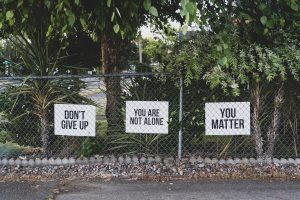
Dear Teachers – Consider A Better Way
We can remember that when our students and clients come to us to share from their vulnerability, we are in a position of privilege. It is a deep honour to be considered a trustworthy confidante. There is a difference, though, between holding space and “seeking to fix or alter.” A teacher should never feel pressured to provide advice or guidance that is out of their scope; that is not their role. We may have all minds of views, opinions, and fears of our own, but we also have the requirement and skill of holding a space apart from those things, an exclusive space of listening to and acknowledging what our students are so generously sharing with us. These are skills that can be cultivated by yoga teachers; they become gifts to those they share them with way beyond the value of any advice.
When we do hold space, here are a few gentle reminders we can give ourselves.
- Offer, at the very least, a judgment-free zone
At the very least, we must promise them respect and security from physical and emotional harm. We can do our utmost to show that we respect their personal sovereignty and inner authority. By imposing our judgements on their behaviours, we are at risk of the reprogramming shame and self-loathing that is part and parcel of depressive illness. They could already be full of fear, and when we issue misguided “warnings,” it is easy to ignite more fear.
- Be aware of your own suffering bias
Perhaps —even without knowing it— we hold a fear around mental distress that means we are in a rush to fix or minimise it in others as a misguided way of looking after ourselves. It is so important to know our own suffering and bias so that we can try to be alert to the risk of imposing them on others when triggered.
- Remember the limits of yoga
Be alert to whether you are, from a place of passion, perhaps overselling what yoga can do. Be sensitive that the individuals you meet carry their internal wisdom and paths to healing, which may differ from what you, yourself, are passionately invested in.
- In doubt, always choose a positive approach and response
In a Trauma-sensitive Yoga approach, there is the concept that any method of dealing with suffering is positive until it is no longer working, or is having more negative affect than it is positive, whatever that coping strategy may be. Yoga can only go so far as to treat suffering in many cases. Other interventions may be necessary, and that is okay. We never want to shame anybody for their choices. When people are seeking freedom from suffering, the seeking is to be applauded.
- It is okay not to give medical advice; in fact, it is best not to
As a general rule, don’t offer medical advice unless you are qualified to do so. It is more authentic to say, “I am not a clinician or psychologist. I haven’t any personal experience of taking medication. But I honour and support your choices.”

- Your choice of words matters
Remember that your students may not be able to find a voice to assert themselves and their own beliefs and choices. We can feel very small and unworthy of speaking up when we are under the pressures of mental disintegration. We can go carefully with the tone and language we use in our responses.
Offering these phrases and quality of attention can be helpful:
“This is not your fault.”
“You did not make this happen.”
“I see and hear you are suffering. I am so sorry this is happening to you. I care.”
“I have not had this experience myself, but I feel for you. You can talk to me any time. I want to understand and to be a support to you.”
“I am here to listen.”
“In what ways can I support you?”
“Have you been able to find a professional to share this with?”
“What support might you find helpful and from whom?”
As a wellbeing mentor and meditation mentor, I have many clients who are experiencing a period of mental or emotional distress and are wondering whether to take medication. The way I handle it is to offer safe space for them to explore, in answer to my open questions, how they feel as they address that possibility.
- Consider sharing your story
I often hear the same voices of internal or externally-imposed shame and fear that I remember from my own experience. The first thing I do is take a breath and let these voices take up some space in the air so I can properly see and hear them. Then I take another breath to remind my inner-younger-self that this is not about me and that I am safe and well now because they did what was right for myself.
And then, I share my story.
I understand not everyone would respect this approach, but I stand by it as an important part of my work. So far, it has had such impact that I will continue to do so. When I say it has had impact, I don’t mean in the sense that I have “converted all my clients to the ways of drugs.” Some decide to take them; others continue without. It is not my intention nor my place to influence a decision but to hold an honest space for one. So often, my clients have only heard from the nay-sayers within them and around them. They have not heard a representative voice from someone who has lived experience. Indeed, they may be surrounded by people who have taken or are taking medication, yet believe they, themselves, are the only ones; such is the stigma there.
Again and again, I have heard: “Thank you for sharing that with me.” And, “I am not going to take them right now, but now I have heard your story, I know it could be an option for me, and that feels good.” And, “If someone like you has taken medication, then I feel better about doing so myself.”
I am Someone like you –just a fellow human being in this messy but magical mystery we call life– as special and precious and worthy of healing as every other of my seven billion brothers and sisters is. I want to be well and happy to be alive, and I want you to be well and happy to be alive. Most of all, I want the stigma around mental health and treatment to be lifted so that every single being has an option, a pathway and support that honours their right to be well and happy to be alive.
As Alison rightfully noted, “If people like you and I are not courageous enough to speak to our own experience, then those poor people who are feeling alone won’t ever be given that reassurance and comfort and sense there is hope for them. If sharing my story is a way I can help and serve others who are struggling with their identity when they are a yogi that wants to be a “good yogi,” and there are these voices in the community that say “thou shalt not take antidepressants,” then that is part of my responsibility as a wellbeing teacher as I see it.
Resources and Support
If you are struggling, or if any of the content of this article raises issues for you, please know that there is support for you. As Russell Brand said in a recent IGTV video, “people are creating movements to support you because you are valuable.”
See Your GP
Always seek advice from a trained professional if you can. Your GP has training and access to information and services that can help you on your path to recovery. They are there for a reason. You don’t have to do it all alone, and there is no badge of honour for doing so.
Talk to A Good Listener
In every country, you can find trained volunteers who answer calls from distressed individuals on the basis that it is therapeutic to talk and be listened to. Here are some of them; a quick Google search should help you find local help.
Helplines
Australia: Lifeline
UK: The Samaritans
Canada: Canada Suicide Prevention Service (CSPS)
US: National Suicide Prevention Lifeline
Here is a list of lifelines around the world.
Online therapy & counselling:
turn2me.org (Ireland & UK)
While these are paid options, some offer financial support.
Online Allies
The “mental health support” hashtag on social media can bring you to some wonderful online-allies. Here are some I particularly love.
On Instagram
Dr. Nicole LePera, The Holistic Psychologist @the.holistic.psychologist
Allyson Dinneen, Emotions therapist @notesfromyourtherapist
Dr. Trish Phillips (doodles) @thedoodledoc
Rita M Loyd, Artist @ritam.loyd
Amber Rae, author and artist @heyamberrae
HUMEN @humenorg
ARE YOU OK? @areyouokaycampaign
On Twitter
Matt Haig @matthaig1
Psychiatry doctor Ahmed Hankir @thewoundedhealer
Be Ur Own Light, A Mental Health Recovery Blog @beurownlight
The Mighty @themightysite
Adam B Hill, M.D. @adamhill1212
Men’s Health Podcast & Blog @themalespace
The Counsellors Café magazine @counsellorscafe
Your Recovery Matters @yourrecoverymatters
Books
The best books I can recommend are Matt Haig’s best-selling and inspiring ones, “Reasons to Stay Alive“ and “Notes on A Nervous Planet.” Matt Haig’s words help so many people who are struggling or overwhelmed emotionally to find their anchor.
“Take Notes on a Nervous Planet twice daily, with or without food. The book is crammed with wisdom, insight, love and wit” — STEPHEN FRY
Research mentioned in this article
Combining Drug Therapy and Psychotherapy for Depression, David Mintz MD (2006). Retrieved February 10th, 2019. https://www.psychiatrictimes.com/combining-drug-therapy-and-psychotherapy-depression
Comparative efficacy and acceptability of 21 antidepressant drugs for the acute treatment of adults with major depressive disorder: a systematic review and network meta-analysis. The Lancet (2018). Retrieved February 10th, 2019. https://www.thelancet.com/journals/lancet/article/PIIS0140-6736(17)32802-7/fulltext
The drugs do work: antidepressants are effective, study shows. Sarah Boseley, in The Guardian (February 2018). Retrieved February 10th, 2019. https://www.theguardian.com/science/2018/feb/21/the-drugs-do-work-antidepressants-are-effective-study-shows
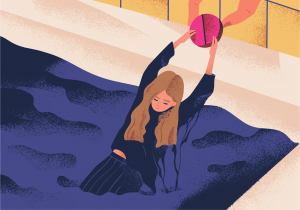
Edited by Ely Bakouche

